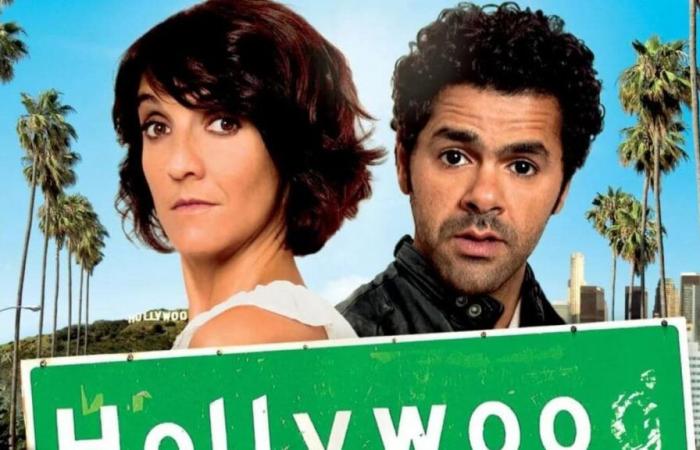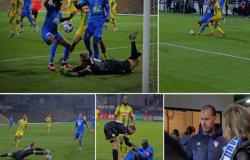Behind the scenes of French comedies (1/5) – This winter, BFMTV reveals the secrets of extraordinary, cult or unusual comedy films. Today, Hollywoo.
We sometimes underestimate the erotic potential of French comedies. In April 2024, in the columns of Le Monde, a young woman, Sofia, confided that she masturbated while thinking about Hollywoo. An astonishing destiny for this popular comedy, a big success of 2011, where Florence Foresti and Jamel Debbouze experience exciting adventures in Hollywood.
When we tell this anecdote to Frédéric Berthe, the director of Hollywoohe bursts into laughter. “My God! I would be curious to know on which scene of Hollywoo this young woman could caress herself under the duvet.” And added: “It's sure, it's surprising. This is the first time (that this has happened to me). Why not?”
The project, however, has nothing erotic about it. It all started with the desire of Florence Foresti (who did not wish to speak in this article) to pay tribute to dubbing actors. “It was nice because there was still a real substance in the film. It wasn’t just a series of sketches,” greets Frédéric Berthe.
The story is as simple as it is effective: when American star Jennifer Marshall decides to retire, her French voice actress, Jeanne (Florence Foresti), goes to Hollywood to change her mind. There, she meets Farrès (Jamel Debbouze), who will help her track the American star.
With Jennifer Aniston?
Florence Foresti dreams of a popular comedy with a big spectacle. She asks Manu Payet to give her the answer. And to play Jennifer Marshall, the production wants Jennifer Aniston. “That was the idea,” confirms Frédéric Berthe. “We tried to contact him. It was a bit of a rejection. But hey, it’s not very serious.”
The comedian is developing the project with Cyril Colbeau-Justin, producer of big hits from the 2000s like 36 quai des orfèvres. “He was a producer like we have less of now,” salutes Frédéric Berthe. “He was a guy who was a little fanciful, a little crazy, but flamboyant. He had the energy to put together films like that.”
Pascal Serieis, Florence Foresti's accomplice on all her written shows, a first version deemed very successful by the production. But two months before filming, in full preparation, Manu Payet left the project to The Adventures of Philibert, Captain Virgin. Jamel Debbouze replaces him at short notice. A godsend, except…
“Not feeling like playing” this role, written for Manu Payet, it requires a rewrite. “As it was planned for someone else, and he knew about it, and we came to see him afterwards, he asked that we adapt it to his personality.”
Visa hassle
In the first version of the scenario, his margoulin character was a “failed actor” who became “an extra specializing in the dead”, remembers Frédéric Berthe. “We found him hanged in a western, crushed under a tank, decapitated during the Revolution… Every time she called him, he was in an incredible position.”
A comic dimension that disappears from the final film. “I'm not sure it was the best thing” to change the role, he adds. “The film is still great, but I think we lost a little bit unfortunately at that moment. Afterwards we should ask Jamel if he has any memories of the first script and if he has no regrets”. “Maybe he regrets,” he smiles.
While the team prepared for filming in Los Angeles in the summer of 2010, Pascal Serieis only had a few weeks to review the script. The preparation of the film is taking place in the United States with the same urgency. “I remember the hassle of visas,” laughs Frédéric Berthe.
“We scouted the locations in three weeks and returned to France. Then we chased after the visas which had still not arrived and we arrived in Los Angeles ten days before shooting.”
Night of negotiations
Pascal Seiries, who has never directed a film before and does not speak English, must share the direction with Frédéric Berthe. He has just filmed the comedy in the United States RTT produced by Cyril Colbeau-Justin. He is the perfect candidate. “It was a long night of negotiations because me, co-directing, on paper, it was impossible, unless I was Nakache and Toledano, having always done that, that is to say having always had a kind of double brain”, remembers Frédéric Berthe.
Against all odds, the collaboration works. “We divided up the tasks really well. He took care of Flo, Jamel and the other actors a lot. I did something that was probably more technical. It was peaceful. We left saying, ' We'll see if we can do it. But in the end, we didn't do too badly,” enthuses Frédéric Berthe.
On set, the directors felt small gaps in the script. Improvisations are necessary to streamline the interactions between the characters played by Florence Foresti and Jamel Debbouze. Particularly during the scene where Farrès makes fun of Jeanne's squint.
“We said to ourselves that we needed a scene between the two that was tender because we didn’t have one,” confirms Frédéric Berthe. “Maybe that’s what the film is missing: scenes between them.” The director regrets it all the more since the alchemy between Jamel Debbouze and Florence Foresti is evident on the screen.
On set, Jamel Debbouze's improvisations are such that you sometimes have to calm your enthusiasm, remembers cinematographer Ludovic Colbeau-Justin. “In the United States, every time an extra speaks, he becomes an actor (and he must be paid accordingly). And since Jamel spoke to all the extras, and this was not planned, during each take , the bill for the film was $5,000!”
Real pressure
If Florence Foresti is not on her first try at the cinema when she shoots Hollywoohowever, she is under pressure after the failures of her first two films at the cinema My friends, my loves (2008) et King Guillaume (2009). “She was not broken like an animal in the cinema, unlike Jamel, who had already made a lot of films”, underlines Frédéric Berthe.
The film's gigantic budget – around 15 million euros – doesn't help. “StudioCanal had still put in quite a bit of money. Obviously there is pressure because you have to bring back a film, it has to make you laugh,” explains Frédéric Berthe. “She was very concentrated, very tense (…) She experienced it a little in suffering.”
“I have the memory of a Florence who carried the project, who really wanted the project to work and who perhaps did not have the feeling of having gone to the end of her (previous) projects”, moderates cinematographer Ludovic Colbeau-Justin. “She didn’t want to give up anything to be proud of the film.”
On set, Florence Foresti can count on Jamel Debbouze. “He was extremely kind to her when she had lots of doubts,” recalls the director, who also remembers a “terrific shoot.” “The idea was to highlight her enormous talent because she has enormous talent.”
“We were unhappy for her”
On the set, the pressure was such that Florence Foresti one day remained locked in her dressing room. Part of the day, the crew waits for her to come out of her dressing room to shoot a crucial scene at the end of the film, in the parking lot of Dodger Stadium. Fortunately, with Jamel Debbouze, they turned it around very quickly, says Frédéric Berthe.
“That day, Flo wasn't feeling well. She was in her dressing room, she couldn't get out, she was feeling anxious. In short, she wasn't in good shape. We waited. Then she finally came out. She apologizes. She's sorry. We did the sequence in 2 hours because we didn't have time anymore.
During the end of filming party, Frédéric Berthe tries to comfort her. “It’s a shame because I feel like you didn’t take advantage enough,” he told her. “I hope you didn’t miss out too much.” “No, not too much, but a little nonetheless,” she replies.
On screen, however, this stress is not felt. Florence Foresti displays the same swirling energy as on stage. “She has absolutely astonishing talent. And then she's a soldier. So it never felt like that. On the set, we were unhappy for her. She was nice to everyone. But we felt that that wasn't the case. wasn't going well.”
Plagiarism
The good understanding continues during assembly. Frédéric Berthe begins editing before giving way to Pascal Sieires and Florence Foresti. “They finished the film the way they wanted.” The differences are “of the order of lace”, he specifies. “They spent a lot of time there. Afterwards, they are probably right.”
“It was still their film for a bit. I have no ego in relation to that,” assures the director. “I directed it, I loved doing it. We had a laugh, it was great, but it was still like their baby. They had written it, they had thought of it.”
Hollywoo released in theaters on December 7, 2011. Several journalists are prohibited from accessing press screenings. The other part of the press praises the film. “It’s not the comedy of the year, but we laugh a lot,” judges Le Parisien. “Foresti has a real comic nature to make this nice comedy take off,” believes Le Figaro.
The public is of this opinion: with 2.3 million entries, it is a triumph. But the triumph is short-lived. On January 5, 2012, Florence Foresti, Pascal Sieires and their co-writer Xavier Maingon were accused of plagiarism by screenwriter Dodine Herry-Grimaldi. She claims to have written, in 2005, a scenario similar to that of Hollywoo.
“I have a bit of morality”
The production denies having read its script. Just like Florence Foresti. “I do not dispute the fact that she was able to develop a similar story since this is very often the case in the field of creation and writing,” she said at the time in a press release .
“Like all strong ideas, the initial idea for this film was obviously shared by others. Since the release of the film, my co-authors and I have already received nearly ten emails from “authors, professional or not, by testifying”, added the comedian, specifying:
“If I had plagiarized the plaintiff's script, I would have saved myself three years of work and perhaps even a few mistakes” I am neither stupid enough nor incompetent enough to have to plunder existing works with impunity. I also have a bit of morals.”
The comedian also says she is hurt by the accusation. “My work in one-woman shows and on television have, I believe, already attested to my abilities as a creative author. I am greatly offended by the interpretation of this information, which is a filing of complaint and not a condemnation .”
Florence Foresti wins her case: the company LGM, which produces Hollywoois not condemned. Major differences between the two scripts were noted. And Hollywoo has been enjoying good days on television: during its first broadcast in 2013, the film attracted more than 5.8 million viewers.






